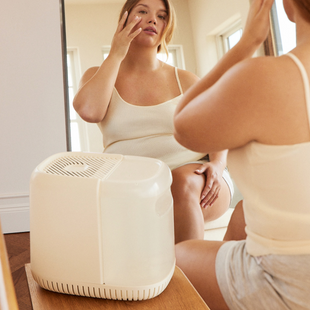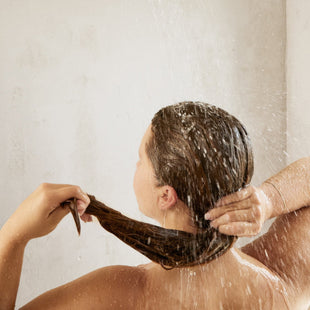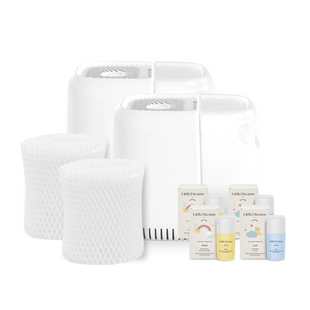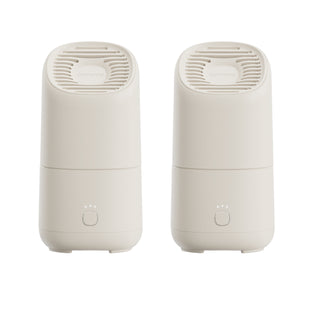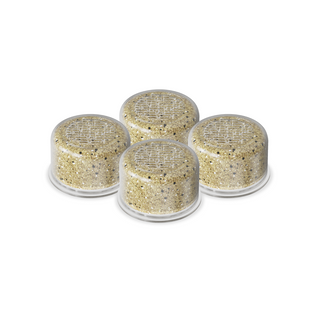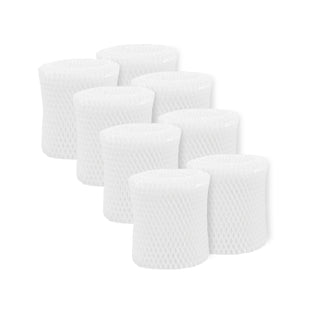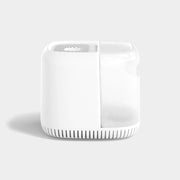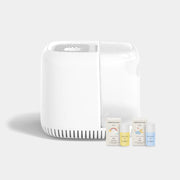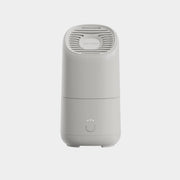Winter bites. The cold, dry winter air can feel like it is actually biting your nose, cracking your skin, and generally making life harder than it should be.
While you can’t change the weather, you can control your home environment and make living conditions more comfortable. Using a humidifier in your home during the winter months brings a bevy of benefits that may have you saying “hey! I wouldn’t mind a few more months of winter.”
Who would have thought?

What are the Benefits of a Humidifier in the Winter Months?
Placing a humidifier in the most commonly used rooms of your home during the winter months can help to improve dry throat and cough, reduce static electricity, rehydrate dry or flaky skin, and kill common winter viruses.
Let’s get into the details.
Benefit #1: improve dry throat and cough from dry, winter air.
Ever wondered why you experience a dry throat or chronic cough during the winter months? The cold air that accompanies winter reduces the moisture content in the nasal passage and throat, leading to congestion, a dry or itchy throat, or an uncomfortable cough.
Increasing the relative humidity (RH) levels in your home can help to lubricate your nasal passage and throat, helping to reduce inflammation and improve your breathing.
Benefit #2: reduce static electricity build-up.
The dry, cold air of the winter months increases the build-up of static electricity. Why is this the case? Dry air binds electrons to surfaces with a strong force. Over time, electrons build-up until they reach a critical maximum, in which case they discharge. This discharge causes a shock upon contact that is, for lack of better words: super annoying.
Increasing the moisture level of the air in your home helps to reduce the strength of the bond between electrons and the surfaces on which they build. The result is an almost unnoticeable discharge meaning no shocks and less static electricity.

Benefit #3: rehydrate dry or flaky winter skin.
Dry, cold air causes an acceleration of water loss from the skin into the atmosphere. When your skin loses water more rapidly than it can be replaced by natural moisturizers (sweat and sebum), you will experience dry skin. When you experience dry skin for an extended period of time, this can lead to cracking, bleeding, or trigger a flareup of common skin conditions like psoriasis or eczema.
Humidifiers are exceptionally effective for dry, flaky skin during the winter months and can help you to maintain healthy, hydrated skin all year long.

Benefit #4: kill common viruses prominent in the winter months.
Air with less than 40% RH can increase your chances of viral infection by interfering with the body’s immune function, increasing the amount of time a virus can “float” in the air, and increasing the survival rate of the virus in your home.
Regular use of a humidifier to maintain optimal humidity levels can help to reduce the survival rate of viruses in your home and decrease the chances of illness during the winter months.
Which is the Best Humidifier During Winter?
Choosing the best humidifier during winter months is crucial to keep you and your family comfortable despite the cold, dry weather.
You should consider output, tank size, and maintenance requirements when choosing the best humidifier for your home.
Sufficient Output
One of the most important features when choosing a humidifier for your home during the winter months is output. A larger-sized room requires a humidifier with more output than a smaller-sized room.
Let’s say that you plan to place your humidifier in your bedroom since this is the room in which you spend the most time. If your room is 400 square feet, then you need a humidifier with at least a 400 square foot output to sufficiently raise RH levels in your bedroom. For reference, Canopy humidifiers have a 500 square foot output, which will effectively humidify an average-sized room.
Larger Tank = Longer Run Time
When choosing the best humidifier for a healthy winter season, you need a device with a moderate to large-sized tank. The larger the water tank, the longer your humidifier can run, uninterrupted. Bonus: the longer the run time, the less often you have to refill the water tank. Win, win.
Make sure to check the tank size and run time before making your purchase. For example, our Canopy humidifier has a 2.5 liter tank with up to 36 hours of run time. This equates to almost 5 nights with no tank refill at an average of 8 hours of sleep per night.
Low Maintenance
During the dry, winter months, you are likely to run your humidifier more often than during the summer months. More frequent usage means more frequent maintenance for most humidifiers, including daily wipe-down, weekly deep cleaning, and scheduled filter replacement.
You want to invest in a high quality, low maintenance humidifier for your winter needs. The less arduous the cleaning process, the more likely you are to avoid cleaning fatigue. Our Canopy humidifier is as low maintenance as it gets. Our proprietary SPA (Smart Persistent Airflow) technology prevents mold from growing inside the unit. All Canopy humidifier parts that touch water (apart from the paper filter) are dishwasher safe, reducing manual cleaning time. We also offer a filter subscription service, which delivers a new filter to your home every 45 days - no Google Calendar reminders necessary.
Additional Benefits of Using a Humidifier
Regular use of a humidifier during the winter months is guaranteed to increase your overall health and comfortability despite environmental conditions.
You now know that humidifiers will improve dry, itchy throat and cough, reduce static electricity in your home, hydrate dry or flaky skin on your face and body, and reduce the spread of common winter viruses. But, did you know that there are even more benefits unrelated to regular humidifier use during the winter months?
Maintaining RH (relative humidity) levels between 40% and 60% throughout the year can improve skin conditions and common breathing problems in babies and children, and can improve the overall health and vibrancy of your house plants.
For Babies and Children…
Babies and young children can hugely benefit from a humidifier in their nursery. Humidifiers can help to relieve cold symptoms, ease uncomfortable congestion, and improve dry, sensitive skin in babies and young children.
It is important to note that the AAP recommends the use of a cool mist humidifier in your child’s nursery as opposed to a vaporizer or steam-based humidifier. Vaporizers are considered a burn hazard, and should not be placed within the reach of a child or a pet for safety.

For Houseplants…
Controlled humidity levels in your home will help your plants thrive.
If you frequently question why you can’t manage to keep houseplants alive, it may not have anything to do with you, per say. Many houseplants including ferns, orchids, fiddle leaf, and more, require higher levels of humidity to thrive. Placing your plants near or in the same room as your humidifier will help to provide them with the perfect amount of moisture for a long, healthy life.


